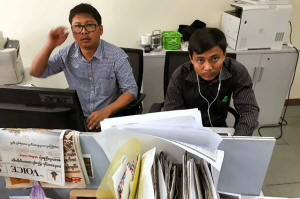|
Myanmar says probe of two Reuters
journalists almost finished, court case to follow
 Send a link to a friend
Send a link to a friend
 [December 21, 2017]
YANGON (Reuters) - A spokesman for
Myanmar leader Aung San Suu Kyi said on Wednesday he had been informed
that the police had almost completed their investigation of two Reuters
journalists arrested over a week ago, after which a court case against
them would begin. [December 21, 2017]
YANGON (Reuters) - A spokesman for
Myanmar leader Aung San Suu Kyi said on Wednesday he had been informed
that the police had almost completed their investigation of two Reuters
journalists arrested over a week ago, after which a court case against
them would begin.
Zaw Htay said the two reporters, Wa Lone and Kyaw Soe Oo, would then
have access to a lawyer and be able to meet members of their families.
"It will not be long. The investigation is almost done," he said by
telephone.
The spokesman said the Ministry of Home Affairs and police told him on
Tuesday that the two men were being detained in Yangon, were "in good
condition" and had not been subjected to "illegal questioning."
A number of governments and human rights and journalist groups have
criticized Myanmar's authorities for holding the pair incommunicado
since their arrest, with no access to a lawyer, colleagues and family
members.
Asked if the police were respecting their human rights, Zaw Htay
replied, "Yes, yes, I have told them not to do those things."

"I told them to act according to the law. They guaranteed that they will
act only according to the law," said Zaw Htay, who was not more
specific.
Wa Lone, 31, and Kyaw Soe Oo, 27, have been in detention since Dec. 12.
There have been no details on where they were being held as authorities
proceeded with an investigation into whether they had violated the
country's colonial-era Official Secrets Act.
The act carries a maximum prison sentence of 14 years.
The two journalists had worked on Reuters coverage of a crisis in the
western state of Rakhine, where an estimated 655,000 Rohingya Muslims
have fled from a fierce military crackdown on militants.
The United States and the United Nations have described the campaign as
ethnic cleansing of the stateless Rohingya people.
The Myanmar military has said its own internal investigation had
exonerated security forces of all accusations of atrocities in Rakhine.
The two journalists were arrested on Dec. 12 after they were invited to
dine with police officers on the outskirts of Myanmar's largest city,
Yangon.
The Ministry of Information said last week that they had "illegally
acquired information with the intention to share it with foreign media".
U.N. RIGHTS INVESTIGATOR BLOCKED
A number of major governments and political leaders, including the
United States, Canada and Britain, and U.N. Secretary-General Antonio
Guterres, have called for the journalists' release.
Human Rights Watch said on Wednesday that the detentions appeared to be
"aimed at stopping independent reporting of the ethnic cleansing
campaign against the Rohingya."
"Their secret, incommunicado detention lays bare government efforts to
silence media reporting on critical issues," Brad Adams, the group's
Asia director, said in a statement.
Separately, the U.N. independent investigator into human rights in
Myanmar said on Wednesday she had been told by the government that it
would not cooperate with her or grant her access to the country for the
rest of her tenure.

Yanghee Lee, U.N. special rapporteur, said she had been due to visit in
January to assess human rights, including allegations of abuses against
Rohingya in Rakhine state.
[to top of second column]
|

Reuters journalists Wa Lone (L) and Kyaw Soe Oo, who are based in
Myanmar, pose for a picture at the Reuters office in Yangon, Myanmar
December 11, 2017. REUTERS/Antoni Slodkowski/File Photo

"This declaration of non-cooperation with my mandate can only be viewed
as a strong indication that there must be something terribly awful
happening in Rakhine, as well as in the rest of the country," she said
in a statement.
Myanmar government and foreign ministry spokesmen were not
immediately available for comment on the criticism from Human Rights
Watch and on Lee's status.
In Washington, the leading Democrat on the Senate Foreign Relations
Committee called for the immediate release of the Reuters
journalists.
"This is outrageous," said Senator Ben Cardin, who has introduced
with 14 other lawmakers legislation that seeks through targeted
sanctions and visa restrictions to hold senior Myanmar military
officials accountable for human rights abuses.\
"It just brings back the memory of the horrible practices with the
repressive military rule."
"PRESSURE ON MEDIA FREEDOM"
The Myanmar Press Council, some of whose members are
government-appointed, told a news conference in Yangon that it would
like to mediate in the case of the Reuters journalists.
Thiha Saw, the council's secretary, told Reuters that the arrests
were not aimed at muzzling the media.
"I don't agree that this is to silence the voices of the journalists
attempting to cover the Rakhine issue independently ... We don't
want to generalize things," he said.
Critics have characterized the arrests as an attack on press freedom
in the former Burma and, although this is not a view widely held in
Myanmar, about one-third of the roughly 100 journalists at the news
conference were dressed in black as a protest against the detention
of the Reuters reporters.
Myanmar has seen rapid growth in independent media since censorship
imposed under the former junta was lifted in 2012.
Rights groups were hopeful there would be further gains in press
freedoms after Nobel peace laureate Suu Kyi came to power last year
amid a transition from full military rule that had propelled her
from political prisoner to elected leader.

However, advocacy groups say that freedom of speech has eroded since
she took office, with many arrests of journalists, restrictions on
reporting in Rakhine state and heavy use of state-run media to
control the narrative.
"If the government continues to ratchet up the pressure on the
independent press, media freedom in Aung San Suu Kyi's Burma will
look a lot more like the media repression during the military
junta," Human Rights Watch's Adams said.
Myo Nyunt, deputy director for Myanmar's Ministry of Information,
told Reuters on Saturday that the case against Wa Lone and Kyaw Soe
Oo had nothing to do with press freedom, and said journalists have
"freedom to write and speak."
(Reporting by Shoon Naing, Thu Thu Aung, Yimou Lee, Simon Lewis and
Jonathan Landay; Writing by John Chalmers; Editing by Raju
Gopalakrishnan, Toni Reinhold)
[© 2017 Thomson Reuters. All rights
reserved.]
Copyright 2017 Reuters. All rights reserved. This material may not be published,
broadcast, rewritten or redistributed. |